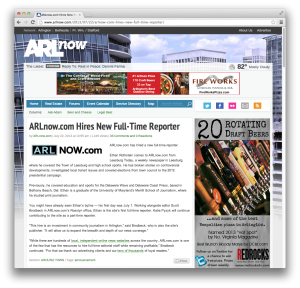Online Journalism Not All Doomed (Even If You Count Past 538)
 Something potentially significant to the future of the news business happened on Monday, and it did not involve Nate Silver.
Something potentially significant to the future of the news business happened on Monday, and it did not involve Nate Silver.
The announcement of the statistical savant’s move from the New York Times to ESPN was a big moment for somebody who started sharing his analysis of political polling under a pseudonym on the Daily Kos site.
But once you reach the level where you have media conglomerates bidding against each other for your services, you stop being a useful lesson for the ongoing business-model problem that is journalism.
No, I was more excited to read that a tiny local-news site called ARLnow.com that focuses on Washington’s next-door neighbor Arlington, Va., had hired its first full-time reporter.
Any new job created in journalism might seem unlikely enough these days. But when that happens at a site that began three and a half years ago as a solo project by a former TV news producer who had quit a job at NBC affiliate WRC so he could try to finish an MBA? And when that journalist, Scott Brodbeck, has to compete against one of the larger newspapers in the country (disclosure: my former employer), other local blogs and even neighborhood mailing lists?
That’s something else.
Unlikely odds and all, ARLnow.com has progressed with a mix of traditional display and help-wanted ads as well as sponsored columns, events, contests and Q&A forums that reach an audience exceeding Arlington’s population. (The site’s advertiser info cites 242,446 visitors and 1,356,307 page views over a 31-day stretch last fall.) Brodbeck wrote Wednesday morning that the site turned its first profit within 12 months and he’s now making as much, certainly pre-tax, as he did at WRC.
In addition to new full-time hire Ethan Rothstein, Brodbeck earlier signed on Katie Pyzyk for a part-time reporter slot. His company Local News Now LLC launched a spinoff site for another D.C. neighbor, BethesdaNow.com, last August and now counts an independent site catering to Prince William and Stafford County residents in suburban Virginia, PotomacLocal.com, as part of its network.
Seeing that got me thinking of other cases of independent journalists who have done well even if they aren’t raking in clicks and cash on a Nate Silver level.
People like to cite Wired and Gizmodo veteran Brian Lam, who got burnt out by the pace of chasing Web traffic with new content, quit and has since found a more relaxed, surfing-optimized business model publishing thoughtfully selected reviews of the best gadget in any particular category at The Wirecutter and now a household-items site, The Sweet Home.
But my favorite example may be my old Washington Post colleague Brian Krebs, who realized he could take his readership, sources, knowledge and expertise to launch his own computing-security blog. His success has bought him the underrated freedom of being able to take time on a story instead of rushing from one post to the next.
(I am not quite ready to lump myself in this group. When I’ve been doing this for as long as Krebs, then we’ll talk.)
The business of journalism still faces huge, sometimes existential problems. But some of the online factors that have pushed newspapers and magazines into their corner have also given individual reporters, photographers and artists–anybody whose work can be publicly identified and followed–a level of agency and bargaining power they didn’t have before.
It’s now easier for them to develop an audience and then retain it as sources of income and destinations of invoices shift. And that’s allowed some of them–by which I mean, us–to find ways to keep at their work without becoming charity cases.
There’s a lesson here. It’s tempting to judge the state of journalism–or any other field being upended by shifts to online distribution, such as music or movies or books–only by how the best-known companies and individuals atop the food chain are doing. But you’ll probably learn more by seeing how individuals with plain-type names are taking advantage of those same changes to carve out something besides the same old business models, and hopefully earn themselves a decent middle-class living or something close to it in the process.
To the extent they are, their sustainable success should count for more than the temporary pain of an incumbent. To the extent they’re not, we’ve got a problem.








